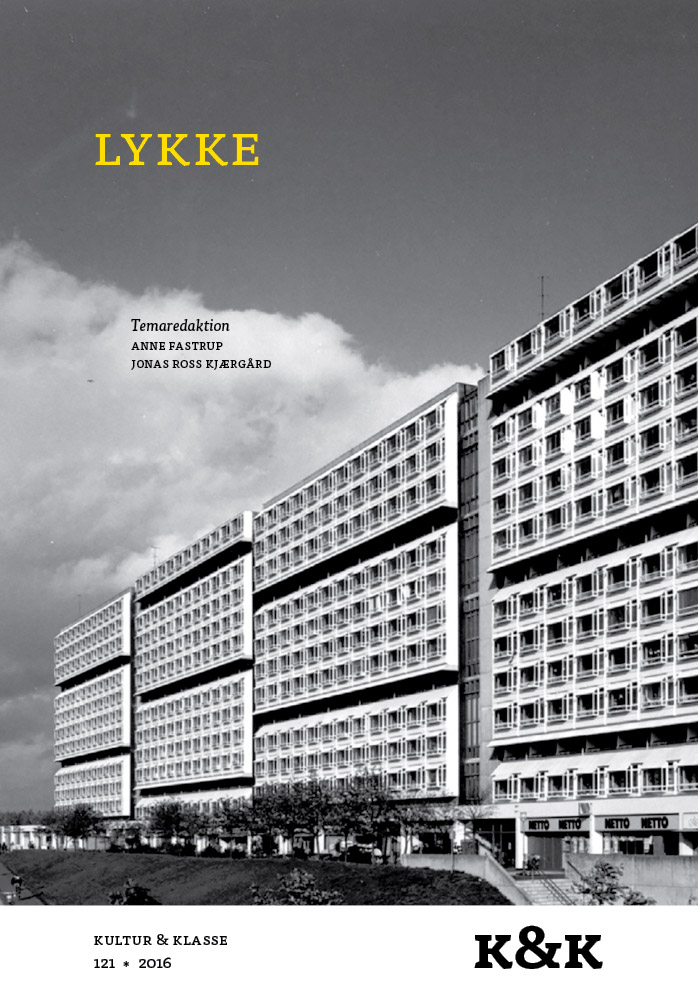Lykken i tilbagetrækningen
DOI:
https://doi.org/10.7146/kok.v44i121.23723Nøgleord:
Retreat, Otium, Revolution, Aesthetics, PoliticsResumé
The concept of happiness becomes of great political importance in France during the Great Revolution. But 19th century French literature will question the possibility of producing a truly modern happiness through society. Withdrawing from post-revolutionary society then becomes a topos of the novel. As I argue in my paper, this is the case in the novels of Stendhal in particular. Inspired by Jean-Jacques Rousseau’s modern concept of otium, Stendhal articulates an opposition between an attitude that is strategic and histrionic, and a withdrawal into contemplation, with only the latter procuring any happiness: a happiness of sensation.
Referencer
Auerbach, Erich. Mimesis: The Representation of Reality in Western Literature. Princeton: Princeton University Press, 1953.
Bardèche, Maurice. Stendhal romancier. Paris: La Table ronde, 1947.
Beugnot, Bernard. Le Discours de la retraite au XVIIe siècle, loin du monde et du bruit. Paris: PUF, 1996.
Encyclopédie, ou dictionnaire raisonné de sciences, des arts, et de métiers, par une société de gens de lettres, bd. I-XVII. Paris : Briasson et Neûchatel, Samuel Faulche, 1751-1765.
Fastrup, Anne. Sensibilitetens bevægelse. Denis Diderots fysiologiske æstetik. København: Museum Tusculanum, 2007.
Fried, Michael. Absorption and Theatricality. Painting and Beholder in the Age of Diderot. Berkeley: University of California Press, 1980.
Gulddal, Jesper. Litterære pasregimer. Bevægelseskontrol og identifikation i europæisk litteratur 1725-1875. København: Museum Tusculanum Press, 2010.
McMahon, Darrin. The Pursuit of Happiness: A History from the Greeks to the Present. London: Penguin, 2007.
Mauzi, Robert. L’idée du bonheur dans la littérature et la pensée françaises au XVIIIe siècle. Paris: A. Colin, 1960.
Mauzi, Robert. “Diderot et le Bonheur”. IN: Diderot Studies 3 (1961): 263-284.
Mauzi, Robert. “Les rapports du bonheur et de la vertu dans l’œuvre de Diderot “. IN: Cahiers de l’Association internationale des études francaises 13 (1961): 255-268
Mitton, Damien. “Pensées sur l’honnêteté”. IN: Moralistes du XVIIe siècle, red. Jean Lafond. Paris: Robert Laffont, 1993.
Mortier, Roland. ”A propos du Sentiment de l’existence chez Diderot et Rousseau: notes sur un article de l’Encyclopédie”. IN: Diderot Studies 6 (1964): 183-195.
Prendergast, Christopher. The Order of Mimesis: Balzac, Stendhal, Nerval and Flaubert. Cambridge: Cambridge University Press, 1986.
Rousseau, Jean-Jacques. Les Rêveries du promeneur solitaire. Paris: Gallimard, 1972.
Saint-Just, Louis Antoine Léon. Œuvres complètes. Paris: Gallimard, 2004.
Schiller, Friedrich. Menneskets æstetiske opdragelse (1795). 2. udg. Haslev: Gyldendal, 1996.
Stendhal. Rødt og sort (1830). Haslev: Gyldendal, 2000.
Stendhal. Klosteret i Parma (1839). Gylling: Gyldendal, 2006.
Downloads
Publiceret
Citation/Eksport
Nummer
Sektion
Licens
Tidsskriftet følger dansk ophavsret.





